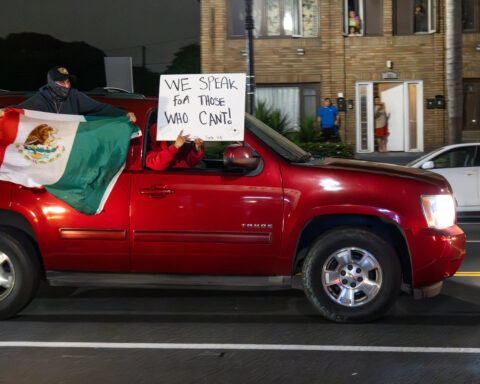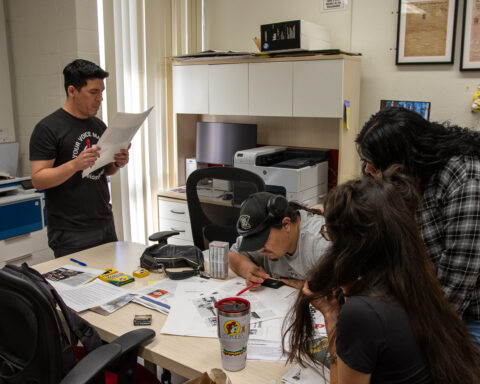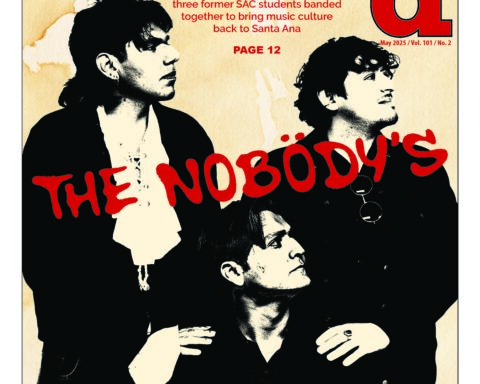Threats to democracy affect us all, and journalists across the country are working together today to highlight both ongoing anti-democratic efforts and what can be done to stop them. This story is part of that project, called Democracy Day.
When most people think of politicians, they think of stuffy people in suits whose lives are so vastly different from their own, they might as well be a different species.
Local politics, however, is a whole different game.
The Santa Ana City Council is made up of seven members, one mayor who represents the entire city, and six councilmembers, each of which lives in the area, or ward, they represent. Two of the newest members, Jessie Lopez and Johnathan Hernandez, represent wards three and five respectively, the neighborhoods SAC straddles.
Both Lopez and Hernandez were active members in the community before they ever thought of entering politics. Here’s how two twenty-something Santa Ana residents from humble beginnings are now striving for change in City Hall, and how they say other young people can do the same.
Jessie Lopez – Ward 3
As Jessie Lopez made her way to classes at California State University Long Beach in early 2017 she noticed a disturbing trend. The school newspaper kept reporting sexual assaults, but nothing was being done to stop them.
She and fellow members of La Raza, a club aimed at supporting Latino students, organized a silent protest on CSULB’s Free Speech Lawn. Her passion for public service was born.
Lopez, who now represents Ward 3 on the Santa Ana City Council, didn’t plan to become a political figure. The daughter of Salvadoran immigrants and the first in her family to graduate college, she remembers her first job working at the swap meet, making $60 per weekend.
Originally a business major when she attended Santa Ana College, her efforts to raise awareness at CSULB instead began a career in public outreach and education spanning several organizations.
Most recently Lopez has worked with Latino Health Access, a nonprofit aimed at connecting community members with resources to meet basic needs. She began working for them at the start of the pandemic.
“For several months, the county healthcare agency only produced information in English,” says Lopez. “Spanish speakers just didn’t have access to the information.”
Latino Health Access worked to fill the information gaps, initially providing Spanish language materials, hosting free COVID test clinics and providing accommodations for those who tested positive but didn’t otherwise have the ability to isolate. As the pandemic progressed, they eventually started setting up events in the neighborhoods being the most heavily impacted to maximize community outreach.
Along with Latino Health Access, Lopez also worked with Rise Up Willowick, a coalition of grassroots groups fighting to get the Willowick golf course, owned by Garden Grove but located in Santa Ana, turned into affordable housing and park space rather than a stadium, luxury apartments, or office buildings.
Lopez says that although they were told surrounding residents had been surveyed and were in favor of the more profitable options, when Willowick organizers began their own polling, many residents had never been told anything about the possible project, let alone asked their opinion on it.
Since entering office, Lopez says one of the accomplishments she’s most proud of is the passage of rent control, which limits how much a landlord can increase the price of rent per year, making Santa Ana the first city in Orange County to pass such an ordinance.
She says she feels like she’s held to a higher standard than her male colleagues, but that it shouldn’t turn others away from serving in office.
“There’s a lot of vitriol towards young women,” Lopez says. “Don’t let the online bullying or harassment deter you from a career in politics. You can’t allow someone who just wants to be hateful to stop you from a career in public service.”
Jonathan Ryan Hernandez- Ward 5
Johnathan Ryan Hernandez sits behind the desk of his City Hall office, a bright yellow, hand-drawn “Defend DACA” banner hanging behind him. Friendly and smiling from ear to ear, he’s not the image most people conjure when they think of the word “politician.” And that’s okay. Hernandez never pictured himself in politics either. At one point he didn’t even see himself living past 21.
“For me, I never even could conceptualize ‘I’m going to run for office one day and I’m going to get elected,” says Hernandez. “I think for me it was more so, when are we going to see people who look like us, are not afraid of us, and who are going to want to sit next to us, and who are going to want to pull us in closer?”
While three seats were open when Hernandez won the 2020 election, he was the only one facing a returning council member. However, the odds were in his favor. Although his opponent, Juan Villegas, had the advantage on Hernandez in experience, he was also a Sheriff with support from the police running during the height of protests in the wake of the murder of George Floyd. Hernandez won with 41% to Villegas’ 32%.
“I took pride in running against him. You know, people don’t think we deserve to have a seat at this table,” said Hernandez. ”So I remember thinking, if I ain’t nothing, what does that say about my neighbors who are looking to me, what does it say about them? And I ran for office and I won. I was 27 at the time.”
And although winning itself is certainly an achievement, the hustle was real. Hernandez wasn’t just campaigning. As a single father, he was also responsible for getting his 10-year-old daughter through school at the height of the pandemic and taking classes himself at UC Davis.
He credits the drive he had to keep going to his grandparents, Enrique and Analisa, and his desire to make them proud. “They worked hard to come here,” he says. “I didn’t want my opportunity as a brown man to go to waste.” Even when he was what he described as “unlovable,” they let him be a kid and were always in his corner.
Hernandez says he comes from a broken household, where his dad and uncles on both sides of the family were gang members, with the exception of his Uncle Sal. He says Sal always took care of his family and was present, and says Sal helped him turn his life around through music. He gave Hernandez a bass guitar as a young teen and got him interested in Chicano and Latin Soul music.
Progressively, he spent more time on music than he did with friends who were getting arrested or shot. In middle school, he organized his first benefit concert, called “Food Not Bombs” in protest of the Iraq war, at El Centro Cultural de Mexico. Attendees donated canned goods to gain entry.
The final nail in the delinquent coffin came when, at 17, he became a father. The birth of his daughter forced him to look in the mirror and decide rather to repeat the broken cycle, leaving his daughter to a life without her parents, or to be better. He chose the latter. “I decided to be somebody else and break that generational curse. I didn’t even know what that meant yet, but I knew I couldn’t be like my dad.”
Now Hernandez wants to encourage the kids like him to believe they’re capable of more, and to bring that back to the community. He encourages them to leave if they need to to get the degrees they need to make change, but then to bring that knowledge back to their neighborhoods to lift them up.
“I live in that community. There’s not a day I don’t drive past parts of this community where I don’t see trauma, but I know my neighbors also aren’t strangers to that,: Hernandez says. “And so that’s what I want to leave them with. Come back to where you came from and make it better.”
- Get your parking pass to avoid a ticket - February 13, 2024
- Vaccine mandate suspended for students and staff - November 23, 2022
- Cannabis cloud kitchen helps entrepreneurs break into the industry - November 2, 2022
















